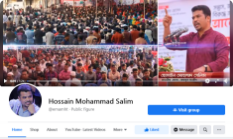Bismillahir Rahmanir Raheem
How Can Students Contribute to Resolving the Global Crisis?
- Determining Students’ Life Goals
Nowadays, students in Colleges, Universities, and Madrasas frequently orient their life purposes toward the pursuit of a professional career. This career-centric mindset becomes ingrained from childhood, as students are encouraged to articulate their life goals in essays such as “My Aim in Life.” When queried about their life goals, students often express aspirations to become doctors, engineers, professors, government officials, bankers, and more. The prevalence of this career-oriented perspective can be attributed to a materialistic worldview.
However, students must reflect on the fundamental truth that a professional career should not be the main purpose of human life. Regardless of whether one becomes a doctor or an engineer, human beings have a supreme purpose in coming to Earth. The Creator crafted humans as part of a grand plan, not whimsically. The essence of human life lies in representing Allah, conducting Khelafat (Vicegerency) of Allah on this planet. This responsibility stands as the main form of worship and the primary duty assigned to human beings.
The Creator endowed humanity with strength and glory by blowing from His Spirit into them, enabling them to represent Allah. This act symbolizes a power of attorney or legal authority granted by Allah to humans, designating them as His vicegerents. Thus, students, as human beings, should recognize that their main purpose in life is to act as representatives of Allah, serving as His Caliphs and vicegerents on Earth. A life devoid of representing Allah is considered a failure, regardless of the success achieved in his professional career. The materialistic pursuits should not overshadow the fundamental duty of being Allah’s representative. By aligning their goals with this higher purpose, students can find fulfillment and meaning beyond their chosen careers
- How to represent Allah?
Representing Allah in one’s life involves adhering to the commands and regulations sent by Allah. Tawheed, La Ilaha Illallah, is the commitment to accept those commands and regulations. For a student to truly represent Allah in the world, they must adhere conventional standards of right and wrong, legal and illegal, and the guidelines provided by Allah. This representation, or Khelafat, serves the purpose of establishing peace and justice in society, putting an end to injustice, theft, robbery, tyranny, and the oppression of the strong over the weak. Paradise awaits those who sincerely carry out this duty.
Regardless of one’s professional pursuits, the acknowledgment of a Creator and the commitment to obeying that Creator should be a constant consideration. One can become a doctor or an engineer by getting a formal education. But this does not mean that he is successful as a man. Real success, be it in the field of medicine, engineering, business, teaching, or any other profession, is achieved when an individual is a ‘Momen’—a true believer. Real success transcends professional achievements and aligns with a devout commitment to Allah’s commands.
Allah has granted humans free will but has also set up Iblis as an adversary to test them. Iblis constantly endeavors to divert people from the path of Allah, leading them away from righteousness. Choosing to obey Iblis results in chaos and injustice, potentially leading to Hell in the Hereafter. These fundamental principles of human existence should be instilled in the hearts of all students. They need to learn the distinctions between right and wrong, justice and injustice, truth and falsehood. Hezbut Tawheed aligns with this real education, emphasizing spiritual and moral development. Without this education, any knowledge acquired by students remains unbalanced, limited to materialistic worldly education that does not bring lasting peace.
- The Impact of Western Philosophy on the Education System
The influence of Western philosophy on our education system is undeniable. Today, we find ourselves under the dominance of Western civilization, having wholeheartedly embraced its ideologies, which have profoundly shaped our worldview. Central to Western philosophy is a perspective that tends towards atheism, discarding the notions of the Hereafter and Messengers of Allah as non-existent. The sacred texts, including the Qur’an, are relegated to mere fabrications and myths in their worldview. The relevance of religious teachings, ethical principles, and sermons has diminished, giving way to an era dominated by science, technology, free thinking, and logical inquiry.
Following military defeats by Western civilizations, their life philosophies have been forcefully imposed on our society. The repercussions are evident in our educated society, where the soulless materialistic ideologies of Western civilization have taken firm hold. Consequently, a segment of our population has become entangled in student politics, leading to involvement in destructive and genocidal activities. Paradoxically, individuals who attain high levels of education find themselves succumbing to self-interest, perpetrating various forms of malevolence. Physicians exploit the vulnerability of patients, well-educated government officials surpass all records in bribery and corruption, and political leaders plunder people’s wealth as if it were their entitlement. Materialistic education has failed to dissuade them from committing these crimes.
- The Four Stages of Genuine Enlightenment
The following are the four stages of enlightenment for students influenced by the materialistic philosophy of Western civilization:
- Self-Knowledge: The initial duty is to know oneself. As Socrates used to emphasize, one must “know thyself.” Questions such as “Where did you come from? Where will you go? What is your duty in this existence?” must be earnestly contemplated. By comprehending one’s being, a pathway to understanding personal duties and responsibilities is paved—a crucial first step toward acquiring knowledge.
- Understanding the Creator: After gaining knowledge about oneself, the next duty is to explore the nature of the Creator. Questions such as “Who is the creator? What are His qualities? What is His power? What does He desire from you?” guide the student in this stage.
- Knowledge of God’s Creation: The third stage involves acquiring knowledge about God’s creation. This encompasses comprehensive knowledge of the entire universe, covering solid, liquid, organic, material, non-material, mountains, planets, stars, and the vast expanse of the cosmos. Practical knowledge of the universe aids in navigating worldly life, understanding interrelationships, uses, benefits, disadvantages, and more concerning various elements in the cosmos.
- Ethical and Moral Knowledge: The final stage involves gaining knowledge about right and wrong, justice and injustice, good and bad, and truth and falsehood. Understanding what is morally proper or improper, the concept of justice, ethical duties, valid and invalid actions, beneficial and harmful deeds for humanity, and similar considerations form the essence of this stage.
These four stages collectively form the foundation of a comprehensive and enlightened education, guiding individuals’ connection to the divine, and the intricacies of the universe.
- The Decisive Impact of Students on the Future World
The curriculum set by each state aims to shape citizens in accordance with the state’s goals and objectives. As a student, you face a crucial choice: conform to the established ‘civilization’ defined by the government or adhere to the expectations set by Allah. Understanding Allah’s intentions for you is paramount. The government’s plan is a separate consideration. We recognize and appreciate your talents and problem-solving capabilities, envisioning a future where you play a pivotal role in leading the nation.
The global situation is precarious, with the world teetering on the brink of World War III. Citizens worldwide are burdened by exorbitant taxes, and soaring commodity prices have left common people struggling. Normal life has been disrupted, and the looming threat of nuclear war intensifies the challenges. Lawlessness, domestic violence, human rights violations, theft, robbery, murder, food adulteration, bribery, corruption, and money laundering have become widespread issues in every country. Looking ahead, human rights violations, theft, robberies, and murders are expected to increase rather than decrease. As an educated individual, the path you choose will determine your character and actions. It’s up to you whether you become a great deceiver, an economic exploiter, an oppressor, a bloodsucker, engage in corruption related to food and medicine, forge fake certificates, become a deceitful and cunning politician, or instead, work towards the welfare of humanity. The decision rests in your hands.
However, conventional education may transform you into a soulless entity driven solely by self-interest, devoid of the development of your humanity. This is attributed to the underlying mantra of self-interest, encapsulated in the belief that academic success leads to personal privileges, as symbolized by the phrase- “Educated people can ride on the motor”.
- Crisis of Ideals Among the Youth
It takes an ideal to instigate a positive transformation in an individual, and that ideal should be firmly rooted in the principles bestowed by Allah. We are referring to the concept of Hezbut Tawheed. Mere possession of ideals or theories is insufficient; equally crucial is the presence of a tangible and inspirational personality to emulate. Present-day youth often lack such figures to look up to, grappling with indecisiveness on various fronts. Their admiration frequently leans towards cricketers, movie heroes, or heroines, yet these individuals often lack true ideals.Can the clergy be considered as ideals? Unfortunately, they seem to engage in religious mongering and compromise with the powerful for personal gain. They even lack a guiding message for the nation. Their focus remains on personal matters and prayers, rendering them incapable of offering a useful ideal. Hezbut Tawheed, on the other hand, provides both a well-balanced ideal and an exemplary personality for the youth to follow.
- Our proposition to students
Our message to the students is that the world is becoming increasingly perilous in the days ahead. If we can unite firmly now under the principle that we adhere only to the laws given by Allah, we can assert that today’s students will not only shape the future of Bangladesh but will also lead the world in civilization, character, knowledge, science, unity, order, technology, and invention. We believe that, inshallah, they will emerge as leaders in various fields.
Today’s students are not merely flipping through the pages of books; they possess talent that can lead them to become government officials or politicians. Nevertheless, at the day’s end, if they lack humanity and a commitment to justice, and if their abilities do not contribute to the well-being of humanity, what purpose do they truly serve?”
Now is the time to transform the flawed, materialistic, unbalanced, irreligious, and barbaric way of life propagated by the West. It’s an opportunity to present a humane, just, and balanced way of life to mankind, and today’s students can play a pivotal role in implementing this change. By responding to our call, you too can discover your true purpose in life as a human being and contribute to the struggle to build a new civilization. Best wishes.




